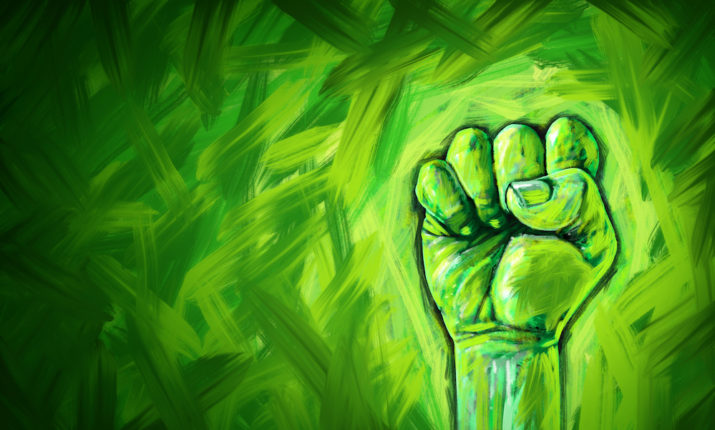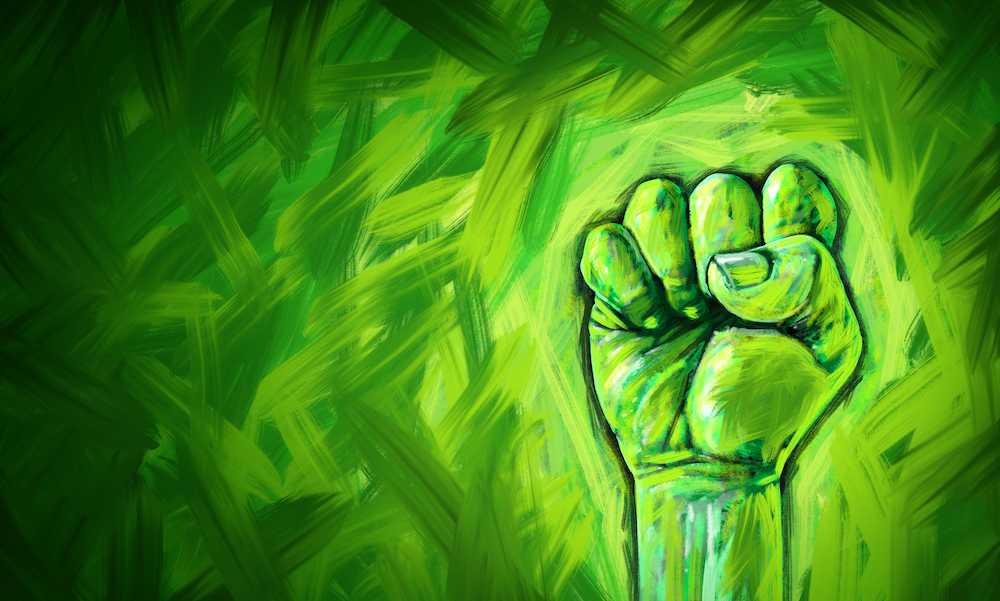

This is part of our special feature, Rethinking the Human in a Multispecies World.
Over the past two years, the modern world has seen unprecedented struggle at the hands of a brutal tyranny of capitalism and a global pandemic―both coupled closely with the undeniable impacts of climate change. Given the political moment, we argue that any potential solutions to the current ecological crises require fundamental cultural, ideological, and social relations paradigm shifts. Any “solutions” to combat climate change that are still rooted in discourses of exploitation and oppression will ultimately only continue the practices and belief systems that got us to this mess in the first place. One of these is the ego-centric worldview that posits humans at the top of a value hierarchy over the more-than-human. In part, this logic system implies that the world organizes around individuated nation-states that largely emphasize human individuals and consumer market ideologies, while neglecting social justice, bioregional diversity, and the health of ecosystems. Such a practice largely limits any possibility for an Earth Democracy, and enables discourses of inequity: separate [countries] but [in]equal. We argue for an ecocentric worldview and its implications for bioregions as alternatives to nation-states. To do so, we examine the role of education and propose to rethink schools and classrooms as potential domains for unlearning dominant worldviews. We encourage this shift through thinking and acting in accordance with what we set forth as ecocentric perspectives and practices. Furthermore, with this switch, we challenge current ways of living to better address the looming existential climate crisis, as well as unjust human suffering and related cruelty to the more-than-human world.
Learning to unlearn dominant worldviews: challenging human supremacy and anthropocentrism
As ecocritical educators working to facilitate and encourage a change in mindsets for learning and leadership, we focus on anthropocentrism—or human-centered thinking—as the basis of an egocentric worldview that is convinced that human beings are superior to other forms of life/matter and that human wants and needs supersede those of everything else. This worldview, an extreme version of anthropocentrism extended into human supremacy, inherently situates human beings at the top of a value hierarchy, with more-than-human species beneath them as seen in Figure 1:

Figure 1. Egotistical Worldview adapted from “Differing Worldviews” (Martusewicz et al. 2021, 10).
Illustrating the socially constructed hierarchical worldview of Western industrial culture, Figure 1 emphasizes the need to engage in recognizing an anthropocentric worldview—that is, one that takes humans as the reference point superior to everything Earthly—and how that worldview is culturally constituted and maintained. In the context of schools, educators can play a vital role in challenging this egocentric worldview that reflects our culture’s extreme anthropocentrism. They have the ability—and arguably, the social and ethical responsibility—to work toward preparing a global citizenry where diverse communities of human cultures understand the need for and potential of (re)constituting this problematic and currently dominant worldview. Such a shift to an ecotistical worldview (Figure 2) would be more supportive of social justice and sustainability.

Figure 2. Ecotistical Worldview adapted from “Differing Worldviews” (Martusewicz et al. 2021, 10). This figure illustrates an ecologically balanced worldview often overlooked and devalued in Western industrial culture.
As it challenges the egocentric worldview, an important premise of an ecocritical shift is that the human-supremacist worldview (an extreme version of anthropocentric thinking) is a cultural construct. In other words, this stance asserts that we, as humans, have learned to think and behave according to culturally constructed, relational ways of understanding, which we use to interpret relationships and thus create meaning. An ecocritical framework focuses on the ways in which meaning is constructed as to be supportive of the health and well-being of the entire community. Our cultural constructions can be interrupted and shifted when we learn to think differently about our relationships to each other and to the natural world. Thus, recognizing an anthropocentric worldview is an important entry point for rethinking human-centrism and the role of educators in teaching toward (un)learning the injustice and pervasive violence of Western industrial culture.
An essential role of educators and researchers committed to ecotistical pedagogies is to recognize and value teaching and learning that do not explicitly perpetuate human-supremacy, and in so doing, work to identify and revalue the critical practices of valuing diversity, mutual aid, and interdependence that still exist in communities all over the world. To help explain this process and in our working with current and future teachers, we compare a human-centered to an ecological worldview. Figures 1 and 2 provide an opportunity for dialogue about the ways in which worldviews can support or conflict with our educational efforts to address the challenges of the twenty-first centuries. As educators engage in a critique of anthropocentrism, they can develop the capability to cultivate habits of mind that support and sustain all species, not just humans. These habits of mind help to challenge destructive assumptions and practices promoted by anthropocentric egotistical assumptions about ourselves and our relationships. Recognizing the ways in which language influences culture and culture influences language is essential as we conceptualize and implement changes to what could and ought to be truly inclusive communities. Language plays an important role in how we interpret and examine the relationship between these two differing, and often conflicting, worldviews. For instance, understanding our work as educators and educational leaders conceptualized through an ecocritical framework challenges the prominence of dualistic and binary thinking in Western industrial culture and the associated culture/nature dualism. This process includes analyzing hierarchized superior/inferior dualisms (like culture/nature, male/female, mind/body, rational/emotional, civilized/savage, etc) in order to identify how such thinking works to uphold and perpetuate a problematic value-hierarchy that frames our understanding of our relationships with one another, ourselves, and the more-than-human communities to which we all belong.
Current governmental responses to climate change are still too often rooted in anthropocentric societal organizing, i.e. the nation-state, which takes the form of many segmented groups individually practicing their own top down politics and interests. Ecosystems, especially those of bioregions which can span across multiple nation-state spaces, are often neglected in priority. We have found Vandana Shiva’s (2015) conceptualization of Earth Democracy to be of most use in rethinking the role of education―more commonly schooling―and social organizing in support of the development of a global citizenry that is not a monoculturalization of Eurocentric ideals, but rather a planet of diverse democracies.
Shiva defines Earth Democracy as “consisting of the local, decentralized communities which include (and protect) all diversity in nature and culture” (Shiva 2015, 8-9). Through the practice of a living democracy, decisions are made not only by those making the decisions at the most local levels, but in defense of more-than-human-species. This decentralized approach, described as localization by Shiva (2015) is:
Based on the interdependence between nature and culture, humans and other species, local and global, micro and macro. Localization treats every place as the center of the world, placing every person, every being as the center of ever widening circles of compassion and care (73).
Thus, aligning with an ecotistical perspective put into practice, Earth Democracy prescribes “self-rule and self-governance” to the communities and ecosystems of which they are a part (Shiva 2015, 9). It challenges the nation-state model as the dominant form of social organizing globally where individuated populations are governed largely by a political minority (be it a few representatives or even a single figure). In an Earth Democracy model, political power begins and emanates from the bottom up and “authority is delegated to more distant levels of government on the principle of subsidiarity: things are most effectively done at the level closest to where the impact is felt” (Shiva 2015, 57). This change from globalized market economies (based on greed and violence) to a “living economy” (based on compassion and care) cultivates better capacities of humans and the nurturing of living democracies for diverse species (Shiva 2015, 75).
Contrary to living economies and bioregionally organized Earth Democracies, the modern nation-state is intimately bound with a necessity for segregation through nationalism and patriotism. According to Giddens (1985), the nation-state can be understood as “a set of institutional forms of governance maintaining an administrative monopoly over a territory with demarcated boundaries (borders), its rule being sanctioned by law and direct control of the means of internal and external violence” (121). Existing in relation with other nation-states, each works within a political framework of capital as the state (Öcalan 2020, 210), a homogenization of national identity and culture (Öcalan 2011), a monopoly of violence, and an extreme enforcement of the control through militarized violence (Smith and Smith 2013). As history continues to repeat itself in vicious cycles of tyrannical governments usurping power from local democracies―often in the proclamation of democratization―we posit that any potential solutions to environmental and social injustices among nation-states have arguably been symbolic, continuing to prioritize the interests of capital over ecosystems. Contrary to this dominant form of authoritarianism masquerading as democracy, we turn our attention toward asking: How might we embrace and value diversity in our social decision-making structures? What might it be like to learn from and with local systems of shared governance that nurture ecojustice, political autonomy, and accountability through bottom-up democracies? When asking these questions and imagining such possibilities, we examine the role of the modern nation-state in maintaining and reproducing an egotistical framework, and alternatively finding hope in Vandana Shiva’s ecotistical Earth Democracy.
An example aligned with Earth Democracy that is explicitly a critique of the modern nation-state is the ongoing communalist political experiment in Northern Syria, Rojava—a democratic confederalism (Öcalan 2011) grounded in democratic autonomy and women’s liberation (Knapp et al. 2016; Strangers In A Tangled Wilderness 2015). From an ecotistical perspective, we argue that alternatives to nation-states ought to consider in their practices of democracy the more-than-human species and the local ecosystems. Expanding upon an ecotistical paradigm, we advocate for pedagogies that include and focus on diverse bioregions.
Pedagogies of diverse bioregions
Now more than ever, educators need to engage in pedagogies that encourage recognition of (and resistance to) all forms of domination. Doing so furthers the potential of fostering spaces of learning together to recognize harmful assumptions and actions that undergird social and ecological injustice. We admire, value, and are firm supporters of a shared commitment to respond to the undeniable atrocities that we––as humans––enact on one another. But we also believe that these atrocities are inextricably connected to the cruelties we perpetuate against non-human animals and the environment. None of these atrocities occur in isolation; they are all interconnected. Hence, the importance of focusing on the social and ecological: diverse bioregions. To confront human supremacy together with other forms of supremacy in education, educators must work as committed allies to those suffering while challenging and confronting the systemic roots of oppression on our respective fronts. An ecotistical approach focusing on the pedagogies of diverse bioregions can help highlight the interconnectedness of the social and environmental.
Drawing on work from EcoJustice Education (Martusewicz et al. 2021), Ecopedagogy (Kahn 2010), Ecocritical Pedagogies (Lupinacci et al. 2019), Critical Place-based Ed (Gruenewald 2003; Gruenwald and Smith 2014), and Indigenous and Land Pedagogies (Basso 1996; Tuck et al. 2014; McCoy et al. 2017; Jacob et al. 2021), pedagogies of diverse bioregions invites educators to address social and environmental injustices occurring at the local and global through an ecotistical perspective. The models for thinking through these oppressive mindsets in educational contexts are useful when we teach with folkx within cultures that predominantly are based in what we presented as egotistical. We want to be clear that what we present for teaching purposes as ecotistical represents what many diverse Indigenous cultures have as a fundamental understanding of self in relationship to community. We aim to expose how Western industrial cultures deeply entrenched in patriarchal, white, and human supremacism combine with hyper-capitalism and ableist heteronormative individualism to constitute deeply problematic relationships among humans and between the human and the more-than-human world. We acknowledge that diverse Indigenous cultures do not need this process and that what we share is not in any way new. Rather, our hopes is that the kind of work we are sharing and proposing aids in developing the awareness, knowledge, and abilities for educators in Western industrial culture. Furthermore, extending from hopes to action, we encourage the practice of recognizing diverse knowledge systems and intentionally working to value different ecotistical epistemologies that for centuries have sustained human communities living in accordance with the diverse species, geographies, and climates in their bioregions.
If we do not rethink the cultural framework rooted deeply in our language, by which dominant meanings are socially constructed, we are destined to re-create and perpetuate many of the problematic relationships that we, as radical educators, often set out to change. We must listen to and learn from social movements and the activists like the leaders of the Black Lives Matter movement, The Women’s Revolution in Rojava, or Water Protectors on occupied Indigenous and First Nation territories. We must also take some actual steps in our studies and enactments of pedagogies in our classrooms toward cultural change. It is an unapologetic pedagogy of democratization, reconciliation, and community expanded beyond the human species.
Pedagogies of diverse bioregions also require a fluidity of learning and doing in both the material and the cultural. Recognizing and protecting local watersheds from profit margins (see Elwha Dam Indigenous protests); engaging in guerilla gardening (Reynolds 2014) to circumvent private property and food deserts—these are just some examples of engaging in pedagogies of diverse bioregions. As educators and teacher educators, we can begin to challenge oppressive cultural discourses in our classrooms. We share ways in which we might begin to utilize an ecocritical framework toward diverse pedagogies of bioregions in our classrooms.
- Engage in teaching and learning that explore diverse projects to rethink the dominant assumptions influencing how we, as humans, construct meaning and thus learn to relate to each other and the more-than-human world.
We must make the commitment to critically and ethically examine how, as teachers, we individually and collectively understand educating, organizing, and taking action toward supporting healthy communities that include all beings. We must acknowledge the intrinsic value of recognizing, respecting, and representing the right of all beings to belong to and live peacefully within an ecological system. For example, we should critically engage in questioning how we language our world:
What does it mean to refer to stacks of trees or the waterways on the planet as “natural resources?”
What does it look like to advocate for the diverse species of our bioregions?
What language further perpetuates social inequalities and undermines human rights in our communities?
We must also think about how we might frame lessons that include ecocritical questions that disrupt dominant worldview assumptions:
What does it mean to be human beings in our diverse communities of life?
Who/what benefits and who/what suffers?
How are learning relationships in our classrooms influenced by value-hierarchies and cultural assumptions?
What does it mean to teach toward the abolition of superior/inferior (either/or) thinking?
What would it look like to make decisions together in community that are in support of challenging human supremacy?
How can challenging human supremacy also be an act of anti-racist and feminist teaching?
- Engage in critical and ethical examinations of community as we come to learn about and live with diverse species in our bioregions.
As notions of community are all too often constructed in terms of white supremacy, patriarchy, and human-centered exclusion, it is important to reconsider community based on who and what is included in its definition and how it contributes to either supporting or undermining the right of all beings to coexist in peace.
Who and what might we be ignoring when we think about who is considered in decisions in our neighborhood community?
What animals and plants live and make homes in our community, and how are we interrelated to them?
What are we doing to practice reciprocity with our diverse human and more-than-human neighbors?
As educators, we can work with students to learn deeply about the local and to imagine how decisions might be made that consider more broadly diverse voices, ideas, abilities, and experiences away from the historical dominance of white male colonial voices. We should aim at engaging students in listening and being responsive to diverse language systems like breathing, smelling, listening to sounds, seeing gestures, and recognizing the diverse weather, climate, water, soils, birds, insects, fungi, forests, and other mammals and animals in our bioregions. Specifically, we ought to work towards identifying—or seeking out—a more-than-human teacher in our specific bioregion (something/one to learn from and intentionally engage in a learning relationship). At first, this is just about making a commitment to learning from this different kind of teacher–student relationship in a way that interrupts habits and assumptions of anthropocentrism and human-supremacy. Then, you could journal over the course of the semester and share your experiences about who you learned from and learned to listen to, and about your ecological surroundings. You would then be committing to learning about the ways in which oppressed communities have suffered and survived the extreme violence of white-male heteronormativity and to not reproducing or existing in complicity with these atrocities.
- Engage in examining community in terms of inclusion by recognizing, respecting, and finding diverse ways in which teaching and learning among all members represent both cultures and species in support of a system of diverse bioregions.
Specifically, we engage in recognizing the role activist networks play in alleviating and eliminating unjust suffering in our communities, by also building networks of solidarity with these organizations.
How can single-issue or locally focused social justice groups make alliances with other social and/or environmental justice groups?
How can we as educators connect with and start conversations between these kinds of organizations, our classrooms, and communities?
For example, in our community, we ask what commonalities and bridges might there be between Water protectors, ANTIFA, Planned Parenthood, the Black Lives Matter movement, and the Sierra Club.This type of questioning starts with learning about who is already having these conversations and how to support their attempts. Additionally, shifting classroom communities is useful to encourage collaboration rather than competition, for example by focusing lessons on fostering and developing skills of community collaboration rooted in mutual aid and interdependence. School and community gardens can be a site of such teaching and learning.
How might we learn to teach from the Black Lives Matter at Schools resources?
What might it be like to teach or be a student in Rojava and what might we learn about other movements in different places that help us locally to resist the antidemocratic violence often coupled with nation-state identities?
- Engage in supporting the diverse approaches to taking up resistance and healing from Western industrial culture and, in solidarity, show respect for epistemologies that differ from the current dominant discourses of Western industrial culture.
We must support the ways in which diverse forms of resistance challenge dualisms that perpetuate value-hierarchized thinking. For example, we can explore how local groups in the community are fighting against past and present acts of colonization. Imagine how educators might teach lessons that question progress rooted in hyper-consumerism and global market ideology. For example, you could have students explore barter and trade in efforts to make explicit that economic systems do not need to be rooted in capitalism, or have students identify non-monetized activities that exist in the community. Additionally, students could explore the speciesist, racial, and gendered dimensions of non-monetized caring work and how, along with commitments to antiracism and feminism, it upholds and strengthens communities and democratic possibilities bioregionally.
Above all, and in addition to the attempts to disrupt institutionalized Western industrial culture that is perpetuated through and within educational spaces, we can also commit to the daily effort of turning our attention to learning toward the local and fostering critical friendships with other humans and non-human animals. Furthermore, as part of building such radical friendships, we advocate for engaging with adversaries, and sharing stories of hope and resilience, while critiquing local and international relations of domination and hierarchies in favor of bioregional Earth Democracies. In such volatile, authoritarian times, it is important that critical educators challenge dominant perceptions of what currently constitutes schooling, education, and knowledge. Collectively, we must imagine with open hearts and minds what is possible when we commit to learning to be members of bioregional Earth Democracies that work locally and in support of living systems.
Brandon Edwards-Schuth is a Doctoral Candidate of Cultural Studies and Social Thought in Education at Washington State University. Their research is situated at the intersections of democratic education, social ecology, and sound curriculum/podcasts and focuses on radical possibilities for reimagining education.
John Lupinacci, PhD, is Associate Professor of Cultural Studies and Social Thought in Education at Washington State University. His work as an ecocritical scholar in teacher education, environmental education, and curriculum studies contributes to his research on teaching to address the conditions of the Anthropocene in K-12 schools and higher education.
References
Basso, Keith H. 1996. Wisdom sits in places: Landscape and language among the Western Apache. Albuquerque, NM: University of New Mexico Press.
Giddens, Anthony. 1985. The nation-state and violence. Cambridge: Polity Press.
Gruenewald, David A. 2003. “The best of both worlds: A critical pedagogy of place.” Educational researcher 32, no. 4: 3-12.
Gruenewald, David A., and Gregory A. Smith, eds. 2014. Place-based education in the global age: Local diversity. Routledge.
Jacob, Michelle M., Stephany RunningHawk Johnson, and Deanna Chappell. 2021. “Do You Know Where You Are? Bringing Indigenous Teaching Methods into the Classroom.” Sociology of Race and Ethnicity 7, no. 2: 278-283.
Kahn, Richard. V. 2010. Critical pedagogy, ecoliteracy, & planetary crisis: The ecopedagogy movement. Frankfurt am Main: Peter Lang.
Knapp, Michael, Flach, Anja, Ayboga, Ercan, Graeber, David, Abdullah, Asya, and Biehl, Janet. 2016. Revolution in Rojava : Democratic Autonomy and Women’s Liberation in Syrian Kurdistan. London: Pluto Press.
Lupinacci, John. 2017. Addressing 21st Century Challenges in Education: An Ecocritical Conceptual Framework toward an Ecotistical Leadership in Education. Impacting Education: Journal on Transforming Professional Practice. Vol. 2: 20-27.
Lupinacci, John, Alison Happel-Parkins, and Rita Turner. 2019. “Ecocritical pedagogies for teacher education.” Encyclopedia of Teacher Education, 1-7.
Martusewicz, Rebecca A., Jeff Edmundson, and John Lupinacci. 2021. Ecojustice education: Toward diverse, democratic, and sustainable communities. Routledge.
McCoy, Kate, Eve Tuck, and Marcia McKenzie, eds. 2017. Land education: Rethinking pedagogies of place from Indigenous, postcolonial, and decolonizing perspectives. Routledge.
Öcalan, Abdullah. 2011. Democratic confederalism. Shreveport, LA: Transmedia Publishing Ltd.
Öcalan, Abdullah. 2020. The sociology of freedom: Manifesto of the democratic civilization. PM Press.
Reynolds, Richard. 2014. On guerrilla gardening: A handbook for gardening without boundaries. Bloomsbury Publishing.
Shiva, Vandana. 2015. Earth democracy: Justice, sustainability, and peace. Berkeley, CA: North Atlantic Books.
Smith, Anthony D., and Anthony Smith. 2013. Nationalism and modernism. Routledge.
Strangers In a Tangled Wilderness. 2015. A Small Key Can Open a Large Door: The Rojava Revolution. New York, NY: Combustion Books.
Tuck, Eve, Marcia McKenzie, and Kate McCoy. 2014. “Land education: Indigenous, post-colonial, and decolonizing perspectives on place and environmental education research.” Environmental education research. 20 no. 1: 1-23.
Published on November 9, 2021




